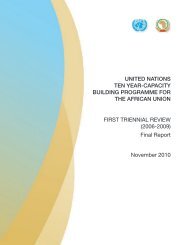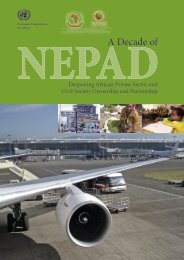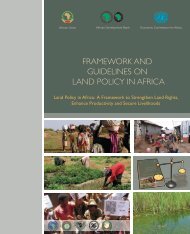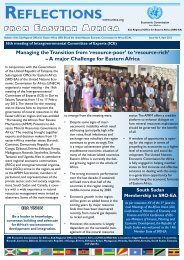Tool kit for Gender and Agriculture - Economic Commission for Africa
Tool kit for Gender and Agriculture - Economic Commission for Africa
Tool kit for Gender and Agriculture - Economic Commission for Africa
You also want an ePaper? Increase the reach of your titles
YUMPU automatically turns print PDFs into web optimized ePapers that Google loves.
2. Approaches to <strong>Gender</strong> Analysis in L<strong>and</strong> Access <strong>and</strong> Ownership<br />
44<br />
<strong>Gender</strong> Issues by Subsector<br />
Because more secure access to l<strong>and</strong> can potentially enhance productivity, public policy<br />
has a role to play in promoting more gender-balanced access to ownership <strong>and</strong> control<br />
of l<strong>and</strong>. Many strategies exist to effect this, <strong>for</strong> example:<br />
• Preserve women’s traditional, communal, or usufruct l<strong>and</strong> rights through nondiscriminatory<br />
registration <strong>and</strong> titling<br />
• Promote the inclusion of women as sole or cobeneficiaries in l<strong>and</strong> re<strong>for</strong>m, titling,<br />
<strong>and</strong> settlement projects<br />
• Review <strong>and</strong> simplify legal procedures to facilitate l<strong>and</strong> titling <strong>for</strong> l<strong>and</strong> held by<br />
all women, including household heads<br />
• Explore ways to list women as co-owners of family l<strong>and</strong> or conjugal l<strong>and</strong><br />
• Where individual women have restricted access to l<strong>and</strong>, explore creative alternatives<br />
to ensuring access, such as purchase or lease of l<strong>and</strong> <strong>for</strong> use by<br />
women’s groups.<br />
To be most effective, the choice of options needs to be explored in close consultation<br />
about national <strong>and</strong> local preferences, in particular, with women’s organizations.<br />
Box 14: Giving Women L<strong>and</strong> Rights <strong>for</strong> Sericulture in India (Ln. 3065, Cr. 2022)<br />
The World Bank−supported Indian National Sericulture Project includes several creative<br />
strategies to promote women’s access to l<strong>and</strong> <strong>for</strong> sericulture activities.<br />
• Local departments prepare proposals supporting requests by women’s groups <strong>for</strong><br />
l<strong>and</strong> to develop under a one-time assistance program.<br />
• Provision has been made in Jammu <strong>and</strong> Kashmir <strong>for</strong> women to obtain joint title to<br />
their mulberry gardens with a “no objection letter” from their husb<strong>and</strong>s or the l<strong>and</strong>owner.<br />
• State l<strong>and</strong>-grant schemes in Andhra Pradesh promote women’s access to l<strong>and</strong>.<br />
• In Karnataka, project funds are used to lease l<strong>and</strong>s <strong>for</strong> women’s groups.<br />
Box 15 : L<strong>and</strong> Title <strong>for</strong> Women in Thail<strong>and</strong><br />
The Bank-financed L<strong>and</strong> Titling Project (Ln. 3797) in Thail<strong>and</strong> intends to<br />
benefit women in two ways:<br />
• Some women will receive title to l<strong>and</strong> in their own right, because women comprise<br />
12 percent of rural <strong>and</strong> 20 percent of urban l<strong>and</strong>owners.<br />
• Ensuring title <strong>and</strong> registration <strong>for</strong> up to 3 million parcels will strengthen security of<br />
tenure <strong>for</strong> both women <strong>and</strong> men, because l<strong>and</strong> sales cannot be registered without<br />
the spouse’s approval <strong>and</strong> signature.







